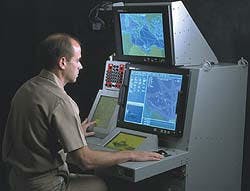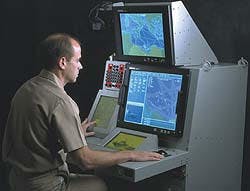Themis Computer builds a mission-critical reputation on the Navy Q-70 shipboard computer program
by John McHale
FREMONT, Calif. — The selection of Themis Computer as the sole provider of UltraSPARC VME single-board computers and systems to the U.S. Navy's AN/UYQ-70(V) program is a big reason for much of the success the company has had the last few years, company officials say.
The so-called "Q-70" program is the Navy's premier commercial-off-the-shelf/open-systems architecture (COTS/OSA) display and processor family of systems for mission-critical applications.
Lockheed Martin Corp. in Eagan, Minn., is the prime contractor for the AN/UYQ-70 family of workstations, which are configured using COTS modules housed in militarized enclosures. The Q-70 workstations are for combat systems aboard aircraft, surface warships, and submarines.
Themis, of Fremont, Calif., supplies the mission-critical applications of Q-70 with products based on UltraSPARC technology from Sun Microsystems in San Jose, Calif., says Rick Studley, director, of federal business development at Themis. Sun supplies directly for relatively benign applications not involved in combat command and control.
Themis was chosen for the mission-critical applications because it had minimal back-panel impact to existing users, he adds. Being part of Q-70 "gives us credibility," Studley says. It is successful example of COTS products performing well in a rugged, military environment, he adds.
During the last two years Themis's overall business has increased about 50 percent, with a large part of that from military COTS products, says John George, vice president of sales and marketing at Themis. "Military systems designers are demanding COTS because their budgets are tight, and they need more bang for their buck," George says. They want products with a rugged, military-standard look and feel at COTS prices, he adds.
"We also learned a lot by working with the guys at Lockheed Martin," who have been making these type of mission-critical products for a long time, he adds. "The Q-70 team (PMS-440, Lockheed Martin, DRS, and Raytheon) is doing a fantastic job integrating COTS products into Navy mission critical systems.
"It is very easy to take commercial white box gear and rack it up, but it is yet another thing to integrate it into a weapons system that requires an immense amount of certification and life-cycle support," Studley continues. "The most critical, and also most difficult achievement is to integrate COTS products while, at the same time, leveraging a lower total cost of ownership over the life of the system.
"The Q-70 program takes a whole-system approach, and seeks to mitigate the problems associated with COTS 'mean- time-to-obsolescence,' by providing their customers coherent and predictable technology insertion/refresh program that is proactive, rather than reactive to the changing tides of the commercial market place. Which is why it is called Hotel Q-70 — boards can be replaced easily in the standard 19-inch racks."
The Themis products replaced Hewlett Packard HP-744 VME computers on the Q-70 because the HP product was going obsolete with no VME follow on, Studley says. Sun SPARC single-board computers present minimal electro-mechanical impact to the current Q-70 system baseline design; the technology allows for easy forward-fit, and very little system modifications for back-fit, Studley says. SPARC also has a migration path from existing HP-based applications, preserves high-end RISC architecture path, and has full-featured UNIX available, he adds.
Solaris is the Q-70's mission-critical operating system because it is stable, scaleable, runs on SPARC and Intel platforms, and is a mainstream UNIX operating system, Studley says. Solaris and the older Q-70 operating systems have a POSIX background so it was easy to migrate from HPUX and HPRT to Solaris, Studley says. Sun also provides a tool free-of-charge, called SCORE to port the software, he adds.
Themis products used in Q-70 include: the USPIIe 500 MHz UltraSPARC VMEbus computer; the RES-204 Rugged Enterprise Server, which is designed to withstand shock loads in excess of 20Gs; and the RES-204s, which is a small four-way SMP server for limited space and portable environments.
For more information on rugged SPARC boards from Themis Computer contact the company on the World Wide Web at http://www.themis.com.

